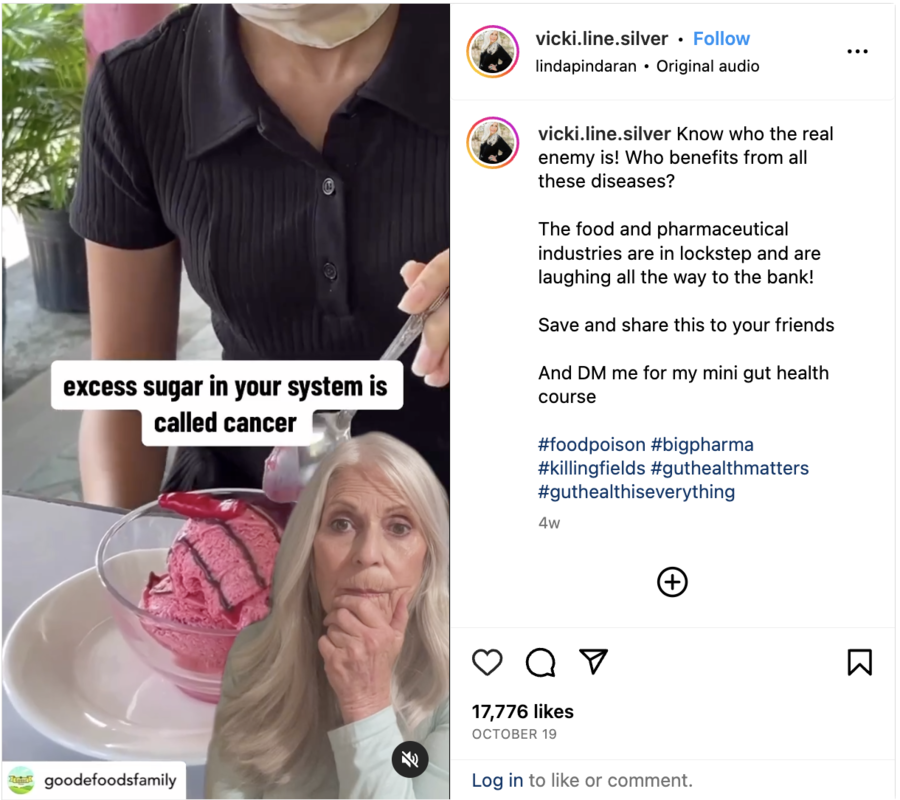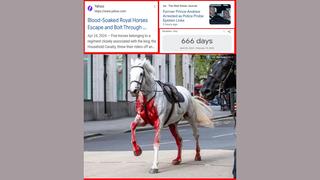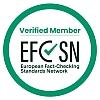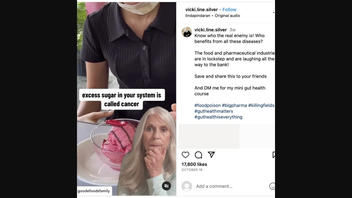
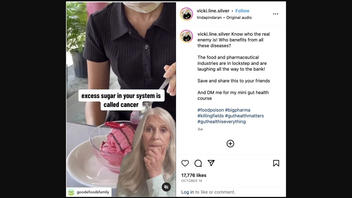
Is cancer caused by the consumption of an "excess" amount of sugar "in your system"? No, that's not true: Sugar itself does not cause cancer. While sugar is not carcinogenic, meaning it does not cause cancer, consuming it is linked to some health conditions and physiological changes that may impact or exacerbate certain cancers, a dietician confirmed to Lead Stories. A cancer research facility referred Lead Stories to publications that debunk the myth that eating sugar causes cancer.
Though a long-held myth, a version of the claim that excessive amounts of sugar cause cancer reappeared in a video on Instagram on October 19, 2023 (archived here). The video's caption read:
Know who the real enemy is! Who benefits from all these diseases?
The food and pharmaceutical industries are in lockstep and are laughing all the way to the bank!
Save and share this to your friends
And DM me for my mini gut health course
#foodpoison #bigpharma #killingfields #guthealthmatters #guthealthiseverything
Below is how the post appeared at the time of writing:
(Source: Instagram screenshot taken Thu Nov 23 21:21:17 UTC 2023)
Eating sugar does not cause cancer, Melissa Prest, a Chicago-based registered dietician nutritionist and spokesperson for the Academy of Nutrition and Dietetics, confirmed. However, excessive sugar intake is linked to health conditions that are known to cause or exacerbate cancer, she added.
"The relationship between increased sugar intake and risk of cancer is indirect, meaning that we can observe an increased risk of cancer in some people with excess sugar consumption but the sugar consumption itself did not cause the increased risk," wrote Prest in an email received on November 22, 2023.
The video posted on Instagram bore a logo for the account goodefoodsfamily. However, as of November 24, 2023, Lead Stories could not find the original video on the goodefoodsfamily account.
The account that reposted the video, vicki.line.silver, included a link in its Instagram bio that redirected users to a Canva-produced webpage with links to various products for sale, including a tab that sold products they said promoted gut microbiome health.
The American Cancer Society defines a carcinogen as "substances and exposures that can lead to cancer." Researchers and agencies apply carcinogenic labeling to products after evaluating evidence that they cause cancer. At the time of the publication of this fact check, Lead Stories could find no proof of such a labeling for sugar.
While sugar itself is not a carcinogen, research suggests that consuming it is associated with health conditions linked to certain cancers.
"Excess sugar intake could lead to obesity, which can be a risk factor for some cancers like breast, ovarian, and liver cancer. Obesity is also associated with inflammation and oxidative stress, both of which have been linked to increased risk of cancer," Prest wrote.
The link between obesity and several types of cancer is well established: Obesity is a risk factor for developing cancers and consuming too much of any food -- including sugar -- can lead to weight gain, contributing to a higher overall risk for cancer, according to the National Breast Cancer Foundation.
But sugar does not "feed cancer." Cancer cells grow fast and need glucose, or sugar, which Cancer Research UK, a major cancer research charity, notes has fueled the rumor that eating sugar causes cancer. One common theory follows that cutting sugar could curb the development and growth of cancerous cells, but it's not that simple. Healthy cells also require glucose, while cancer cells also need other nutrients necessary to healthy cell functionality, including amino acids and fats.
"When we eat carbohydrate foods our body will break down the sugar to its most basic form and use it for energy or store it to use as a source of energy at a later time. All cells, including cancer cells, will use sugar as a source of energy. Cancer cells grow due to a disruption in the cellular cycle not because sugar is its energy source," Prest wrote.
Experts with the MD Anderson Cancer Center at the University of Texas don't warn against eating sugar but, rather, advise that a healthier consumption of sugar can reduce the risk of cancer. The Center recommends eating a moderate amount of sugar, being aware of "hidden sugar in food" that goes by other names, opting for natural sugars and avoiding artificial sweeteners.
In an email to Lead Stories received on November 16, 2023, Jamie Anderson, a program manager for the Center, referred to informational articles on the topic:
Eating sugar doesn't have many benefits. While it doesn't cause cancer on its own or cause cancer to spread, the calories in sugar are empty calories. That means sugar doesn't have any nutrients. Consuming too many calories in foods with lots of added sugar can lead to weight gain or even obesity, which has been tied to several types of cancer.
"The dietary guidelines recommend that no more than 10% of your daily calories should come from added sugars. You can reduce your risk for cancer by maintaining a healthy weight, eating a diet with a variety of whole foods, limiting alcohol intake, and ceasing smoking if you currently smoke," Prest added.
Other cancer-related rumors that Lead Stories has debunked can be seen here.

